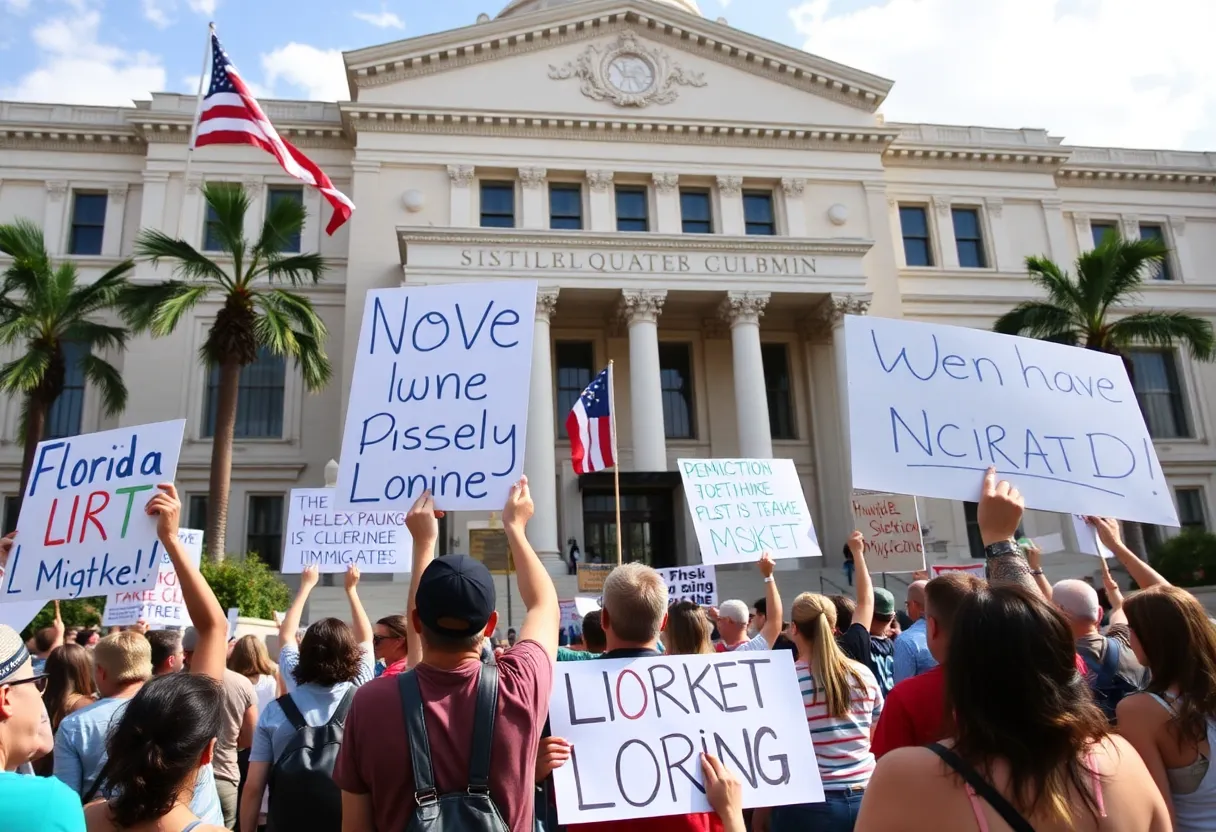News Summary
Florida’s Governor Ron DeSantis has signed two contentious immigration bills into law, stirring debate and financial implications. These laws establish a State Board of Immigration Enforcement and reclassify illegal entry as a misdemeanor, while also repealing in-state tuition for undocumented students. With a hefty price tag for taxpayers and mixed responses from legislators, this legislation reflects a broader trend in Republican policies aimed at tightening immigration rules across the nation.
Big Changes for Immigrants: Florida Governor Signs New Bills
In the sunny state of Florida, the air is buzzing with news as Governor Ron DeSantis has just signed two highly controversial immigration bills into law on February 13, 2025. This came quickly after they passed through the Legislature, which has stirred up quite a mix of emotions among local folks and policymakers alike.
Inside the New Laws
So, what exactly do these new laws mean for residents? Let’s break it down. First off, the governor’s new initiatives come on the heels of some hefty debates among Republicans about how to properly tackle immigration, particularly in alignment with former President Donald Trump’s agenda. DeSantis expresses a sense of camaraderie in overcoming those internal party differences.
Among the measures he signed, three stood out, including the establishment of a new State Board of Immigration Enforcement. This board has quite the roster, including key figures like the governor, the commissioner of agriculture, the attorney general, and the chief financial officer. The goal here? To streamline how Florida handles immigration enforcement.
Financial Implications
As you might expect with any big government move, there’s a price tag attached. Taxpayers can anticipate a cost of around $298 million. This money will fund various initiatives, including over 50 new immigration enforcement officers and grants for local law enforcement. The new board will also allocate $250 million in grants to help local agencies sync up with federal officials for immigration enforcement.
What’s New and What’s Gone?
One of the striking features of the signed bills is SB 4-C, which makes illegal entry into Florida a misdemeanor. Furthermore, it’s pushing the envelope by suggesting the death penalty for undocumented immigrants convicted of serious crimes like murder or sexual abuse against minors. This has raised eyebrows and sparked debates around its constitutionality—especially given prior Supreme Court rulings on similar matters.
Not to mention, the new bills come with the unfortunate repeal of a previous law that allowed in-state tuition for undocumented students, affectionately known as “Dreamers.” After all the discussions, an amendment intended to protect current in-state tuition students failed, leaving many students and advocates feeling disheartened.
The Legislative Process
Votes were cast along party lines, highlighting the divisive nature of these proposals. Some Republicans did join Democrats in opposing elements of the legislation, reflecting the complex landscape within the party. It seems that even among those who lean conservative, there are varied opinions on how to approach immigration reform.
Future of Local Law Enforcement
In a significant twist, the creation of the State Immigration Enforcement Council signifies a push for local law enforcement to take a more active role in immigration matters. This council will consist of eight sheriffs and police chiefs from different counties, potentially leading to widespread changes in how immigration laws are enforced at a local level.
Seeking Consensus Amid Tension
After the bills passed, DeSantis expressed gratitude towards the legislators for their cooperation and support. However, tensions between the governor and some GOP lawmakers still linger—a testament to the heated negotiations that preceded this legislative outcome.
Nationwide Impact
This wave of legislation mirrors a broader trend among Republican lawmakers across the country, aiming to impose tighter immigration rules amid growing public sentiment favoring deportation policies. A recent poll reveals that approximately 60% of Americans support deporting undocumented immigrants, though that support drops to around 43% for those without criminal records. It raises intriguing questions about public opinion and the future of immigration policy in the U.S.
As Florida navigates these changes, the conversation about immigration continues to evolve, impacting countless lives both directly and indirectly. The outcome of these measures will surely be felt far beyond the state’s borders, prompting discussions on justice, access to education, and community safety.
Deeper Dive: News & Info About This Topic
- Florida Governor’s Office
- Florida Phoenix
- WPTV
- NBC Miami
- Wikipedia: Immigration in the United States







